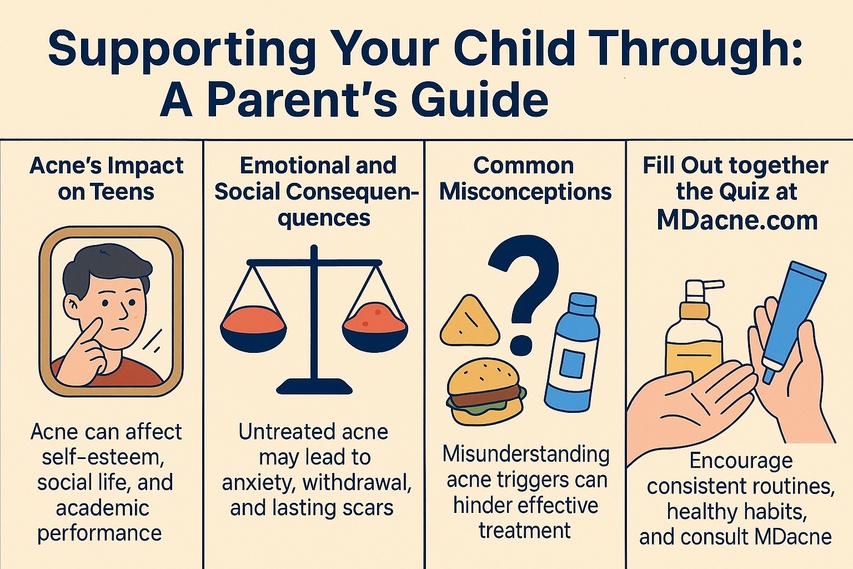
Key Points
- Acne can seriously affect teens’ confidence and mental health, but early treatment and consistent care make a lasting difference.
- Parents can support their teens by promoting gentle routines, acne-friendly habits, and choosing products like MDacne tailored to severity.
- Diet, makeup, and emotional support all play roles in acne management—empowering teens with knowledge leads to healthier skin and self-esteem.
How Parents Can Help Teens Manage Acne
Acne doesn’t just affect the skin and can significantly impact a teen’s self-esteem, social life, and academic performance. Fortunately, today’s treatments can address all types of acne, from mild breakouts to severe cases. If you’re a parent of a teen struggling with acne, here are some essential tips and strategies to guide you.
Know That Acne Is Treatable
It’s a common misconception that acne will go away with age. The truth? The average duration of untreated acne is nine years, and about 15% of people with untreated acne are left with permanent scars. Early intervention can significantly affect your child’s skin health and confidence.
Start with Prevention
Simple changes in behavior and habits can reduce acne flare-ups:
- For forehead acne: Avoid headbands, baseball caps, and hair gels.
- For body acne: Avoid tight clothing and backpacks that trap sweat and irritate the skin.
- After sweating: Encourage your teen to wash their face and shower immediately, including washing their hair at least once daily.
These adjustments and a consistent skincare routine can help prevent breakouts.
Understand the Type and Severity of Acne
Effective acne treatment depends on identifying the type and severity of the condition.
- Mild acne: Often treatable with topical products like medicated cleansers and creams.
- Severe acne: May require oral medications or professional intervention.
Using apps like MDacne can quickly determine the severity of your teen’s acne and recommend appropriate treatments, saving time and frustration.

Treating Acne Can Improve Mood
Teenagers are naturally moody, but if your child seems unusually withdrawn, anxious, or depressed, acne could be a contributing factor. Studies show that addressing acne can positively impact mental health, improving confidence and emotional well-being.
Commitment Is Key to Success
Teens lead busy lives filled with school, activities, and social commitments, but sticking to a skincare routine is essential. Encourage your teen to cleanse their face twice daily—once in the morning and again at night. Consistency is critical for seeing results.
Diet Can Influence Acne
While nagging about food choices might backfire, understanding the Diet's role in acne can help guide healthier decisions:
- Foods to avoid: Cow’s milk, dairy products, and whey protein (often used in bodybuilding supplements) can worsen acne.
- Healthier alternatives: To support skin health, encourage nutrient-rich whole foods, such as fruits, vegetables, lean proteins, and whole grains.
Help Your Teen Choose the Right Makeup
For teen girls, covering acne with heavy makeup can seem like the solution, but it often makes things worse. Poor makeup choices can clog pores and exacerbate breakouts, potentially leading to permanent scars.
Help your teen select makeup labeled “oil-free” and “noncomedogenic”, which are designed not to clog pores. Please encourage them to remove makeup thoroughly at the end of the day to prevent irritation.
Final Thoughts
As a parent, you play a crucial role in helping your teen navigate the challenges of acne. With the proper guidance, consistent care, and patience, your teen can achieve healthier skin—and greater confidence.
To find the right acne treatments for your unique skin, take the free skin assessment by clicking here.



